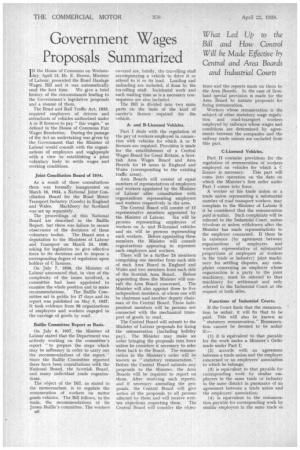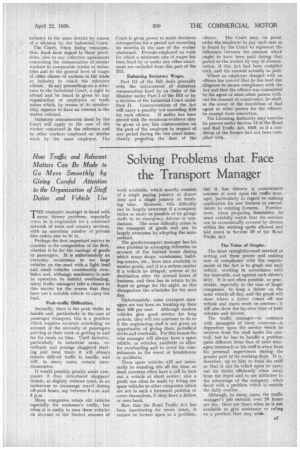Government Wages Proposals Summarized
Page 40

Page 41

If you've noticed an error in this article please click here to report it so we can fix it.
I N the House of Commons on Wednesday, April 13, Mr. E. Brown, Minister of Labour, presented the Road Haulage Wages Bill and it was automatically read the first time. We give a brief history of the circumstances leading to the Government's legislative proposals and a résumé of them.
The Road and Rail Traffic Act, 1933, required employers of drivers and attendants of vehicles authorized under A or B licences to pay "fair wages," as defined in the House of Commons Fair Wages Resolution. During the passage of the Act an undertaking was given by the Government that the Minister of Labour would consult with the organizations of employers and wockpeople with a view to establishing a joint voluntary body to settle wages and working conditions.
Joint Conciliation Board of 1934.
As a result of these consultations there was formally inaugurated on March 16, 1934, a National Joint Conciliation Board for the Road Motor Transport Industry (Goods) in England and Wales. Machinery for Scotland was set up separately.
The proceedings of this National Board are described in the Baillie • Report, but there was failure to secure observance of the decisions of these voluntary bodies. The Board sent a deputation to the Ministers of Labour and Transport on March 24, 1936, asking for legislation to give effective force to its decisions and to impose a corresponding degree of regulation upon holders of C licences.
On July 7, 1936, the Minister of Labour announced that, in view of the complexity of the issues involved, a committee had been appointed to examine the whole position and to make recommendations. The Baillie Committee sat in public for 17 days and its report was published on May 5, 1937. It took evidence from 36 organizations of employers and workers engaged in the carriage of goods by road.
Baillie Committee Report as Basis.
On July 6, 1937, the Minister of Labour stated that the Department was actively working on the committee's report "to prepare the steps which may be neCessary ih order to carry out the recommendations of the report. Since the Baillie Committee reported there have been consultations with the National Board, the Scottish Board, and many individual trade organizations.
The object of the Bill, as stated in the memorandum, is to regulate the remuneration of workers on motor goods vehicles. The Bill follows, in the main, the recommendations of Sir James Baillie's committee. The workers B6 covered are, briefly, the travelling staff accompanying a vehicle to drive it or attend to it or its load. Loading and unloading are included, if done by the travelling staff. Incidental work and such waiting time as is a necessary consequence are also included.
The Bill is divided into two main parts on the basis of the kind of carrier's licence required for the vehicle.
Aand B-Licensed Vehicles.
Part I deals with the regulation of the pay of workers employed in connection with vehicles for which A or B licences are required. Provision is made for the establishment of a Central Wages Board for Great Britain, a Scottish Area Wages Board and Area Boards for 10 areas in England and Wales (corresponding to the existing traffic areas), Area Boards will consist of equal numbers of representatives of employers and workers appointed by the Minister of Labour after consultation with organizations representing employers and workers respectively in the area.
The Central Board will consist of 12 representative members appointed by the Minister of Labour. Six will be persons representing employers of workers on Aand B-licensed vehicles and six will be persons representing such workers. Before appointing these members the Minister will consult organizations appearing to represent such employers and workers.
There will be a further 24 members comprising one member from each side of each Area Board in England and Wales and two members from each side of the Scottish Area Board. Before appointing these the Minister will consult the Area Board concerned. The Minister will also appoint three to five independent members, of whom one will be chairman and another deputy chairman of the Central Board. These independent members will be persons not connected with the mechanical transport of goods by road.
The Central Board will submit to the Minister of Labour proposals for fixing the remuneration (including holiday pay). The Minister may make an order bringing the proposals into force unless he considers it necessary to refer them back to the Board. The remuneration in the Minister's order will be known as " statutory remuneration." Before the Central Board submits any proposals to the Minister, the Area Boards will be required to report on them. After receiving such reports, and if necessary amending the proposals, the Central Board will give notice of the proposals to all persons affected by them and will receive written objections respecting them. The Central Board will consider the objet tions and the reports made on them by the Area Boards, In the case of Scotland special provision is made for the Area Board to initiate proposals for fixing remuneration.
Workers whose remuneration is the subject of other statutory wage regulation and road-transport workers employed by railways whose wages and conditions are determined by agreements between the companies and the railway trade unions are excluded from this part.
C-Licensed Vehicles.
Part II contains provisions for the regulation of remuneration of workers employed on vehicles for which a C licence is necessary. This part will come into operation on the date on which the Minister's first order under Part I comes into force.
A worker or his trade union or a trade union representing a substantial number of road transport workers, may complain to the Minister of Labour if it be considered that the remuneration paid is unfair. Such complaints will be referred to the Industrial Court, unless frivolous or unless withdrawn after the Minister has made representations to the employer concerned. If there be in existence (by agreement between organizations of employers and workers representative of substantial proportions of employers or workers in the trade or industry) joint machinery for settling disputes, any complaint concerning an employer whose organization is a party to the joint machinery, must be referred to that machinery for settlement and only referred to the Industrial Court at the request of both sides.
Functions of Industrial Courts.
If the Court finds that the remuneration be unfair, it will fix that to be paid. This will also be known as " statutory remuneration," Remuneration cannot be deemed to be unfair if:—
(1) it is equivalent to that payable for the work under a Minister's Order made under Part (2) accords with an agreement between a trade union and the employer concerned or an employers' association to which he belongs: (3) is equivalent to that payable for corresponding work by similar employers in the same trade or industry in the same district in pursuance of an agreement between a trade union and the employers' association; (4) is equivalent to the remuneration payable for corresponding work by similar employers in the same trade or industry in the same district by reason of a decision by the Industrial Court. The Court, when fixing remuneration, must have regard to these provisions, also to any collective agreements concerning the remuneration of similar workers in comparable trades or industries and to the general level of wages of other classes of workers in the trade or industry to which the reference relates. In any proceedings on-a reference to the Industrial Court, a right to attend and be heard is given to any organization of employers or trade union which, by reason of its membership, appears to have an interest in the matter referred.
Statutory remuneration fixed by the Court will apply to the case of the worker concerned in the reference and to other workers employed on similar work by the same employer. The Court is given power to make decisions retrospective for a period not exceeding six months in the case of the worker concerned. Persons employed on work for which a minimum rate of wages has been fixed by or under any other enactment are excluded from this part of the Bill.
Enforcing Statutory Wages.
Part III of the Bill deals generally with the enforcement of statutory remuneration fixed by an Order of the Minister under Part I of the Bill or by a decision of the Industrial Court under Part II. Contraventions of the Act will carry a penalty not exceeding £20 for each offence. If notice has been served with the summons evidence may be given of any like contravention on the part of the employer in respect of any period during the two years immediately prerding the date of the offence. The Court may, on proof, order the employer to pay such sum as is found by the Court to represent the difference between the amount which ought to have been paid duriag that period to the worker by way of remuneration, if this Act had been coniplied with, and the amount actually so paid.
Where an employer charged with an offence has proved that he has used due 'diligence to secure compliance with the Act and that the offence was committed by his agent or some other person without his consent or connivance, he shall, in the event of the conviction of that agent or other person for the offence, be exempt from conviction.
The Licensing Authority may exercise its powers under Section 13 of the Road and Rail Traffic Act, 1933, as if a condition of the licence had not been complied with.


































































































